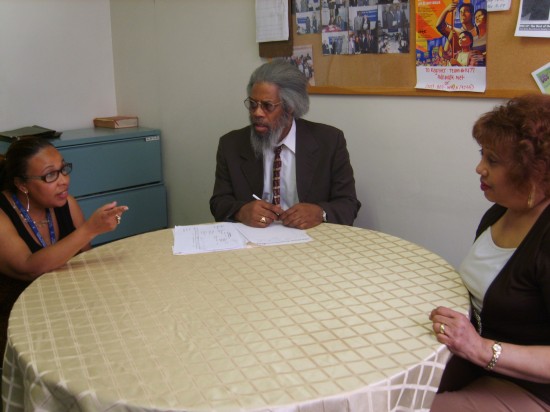
Eloisa Perez was so worried about her daughter Elisa Vallejo showing up late to class and getting bad grades that she turned to the city’s Administration for Children’s Services for help.
“She wasn’t listening to me,” said Perez. “Young people don’t understand about needing an education.”
The city agency sent the mother and daughter to the Institute for Mediation and Conflict Resolution, a mediation center near the Hub in Mott Haven.
“We promote peaceful relationships,” said Titus Rich, director of the organization’s mediation services.
Rich has been with the institute for 24 years, helping resolve conflicts between parents and children, among students, neighbors, or coworkers. “We provide an opportunity to listen to and understand each other,” he said.
Trained mediators arbitrate disputes of all kinds at no charge, helping defuse tensions over customer dissatisfaction with cars they’ve bought, child visitation issues stemming from court cases, and disagreements between parents of special ed students and school officials. Participation in the program can prevent complainants from having to got to court over their unhappiness.
The conversations can sometimes become heated, but “Noise never killed anyone,” said Rich.
Funded with money from the city and state, the non-profit organization opened in 1972 with a Ford Foundation grant, hoping to demonstrate how techniques used in labor negotiations could also be effective in disarming legal and personal disputes.
The agency,’s seven staff members serve as counselors, and help run training workshops in peer mediation and conflict resolution, including a 40 hour-course that costs $600 for a certificate. Some companies send their employees to the mediation trainings to help resolve workplace issues.
Some clients come in on their own, but others are mandated to go by Adult and Children Services, courts, police, and schools.
“The school was calling every day,” said Perez. But because she works a full time job and takes English as a second language courses at night, “My daughter wasn’t being disciplined,” she added.
At home, her daughter Elisa felt she couldn’t tell her side of the story. “But, I didn’t take school seriously then,” she said.
“The kid has a right to speak their mind too,” said Rich. “And they always tell us ‘this is the first time I’ve got to say anything.’”
After giving both mother and daughter time to speak, the mediator told Elisa the same things her mother was saying.
“That helped,” said Perez. “Just hearing it from someone else.”
“I take my education more seriously now,” said Elisa. “I fixed it.”
“You have to be heard before you listen,” said Rich. “We have clients that come back and tell us how their lives have been impacted.”
Elisa is doing much better in school now. Her mother no longer gets those daily phone calls from the school.
“It’s not my life, but for parents, if it’s good for your kids, it’s good for you,” she said.
